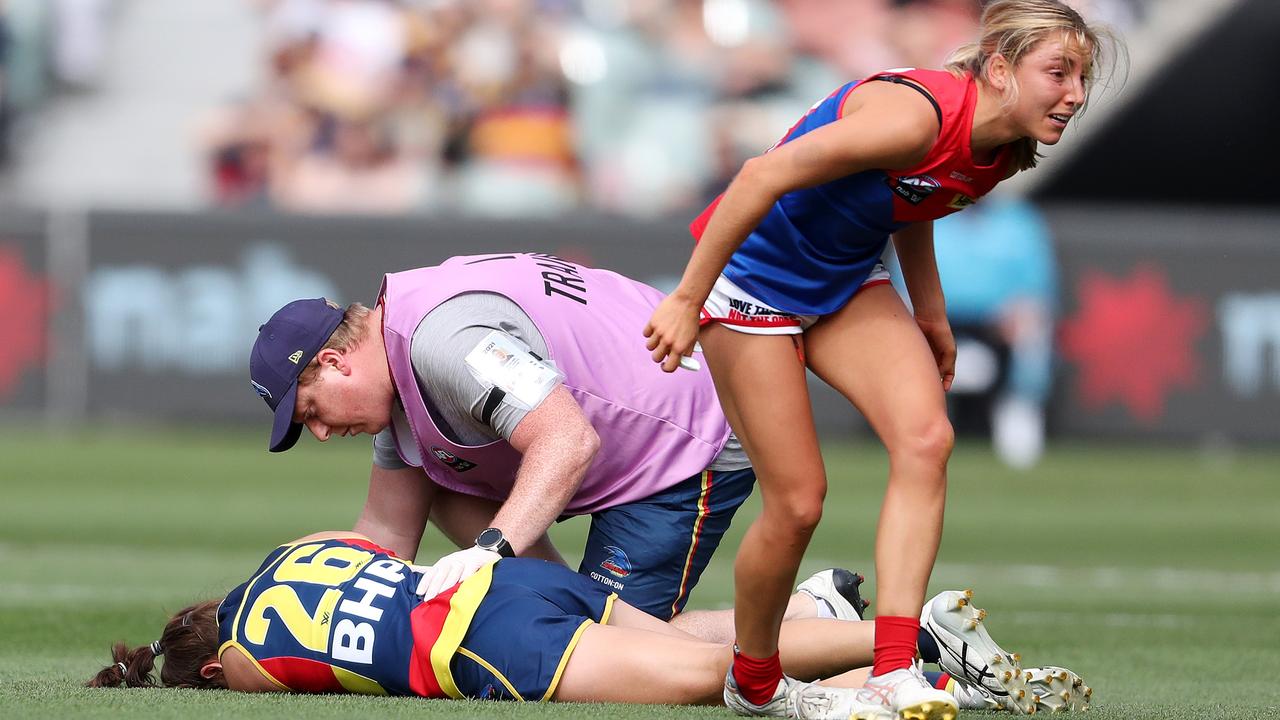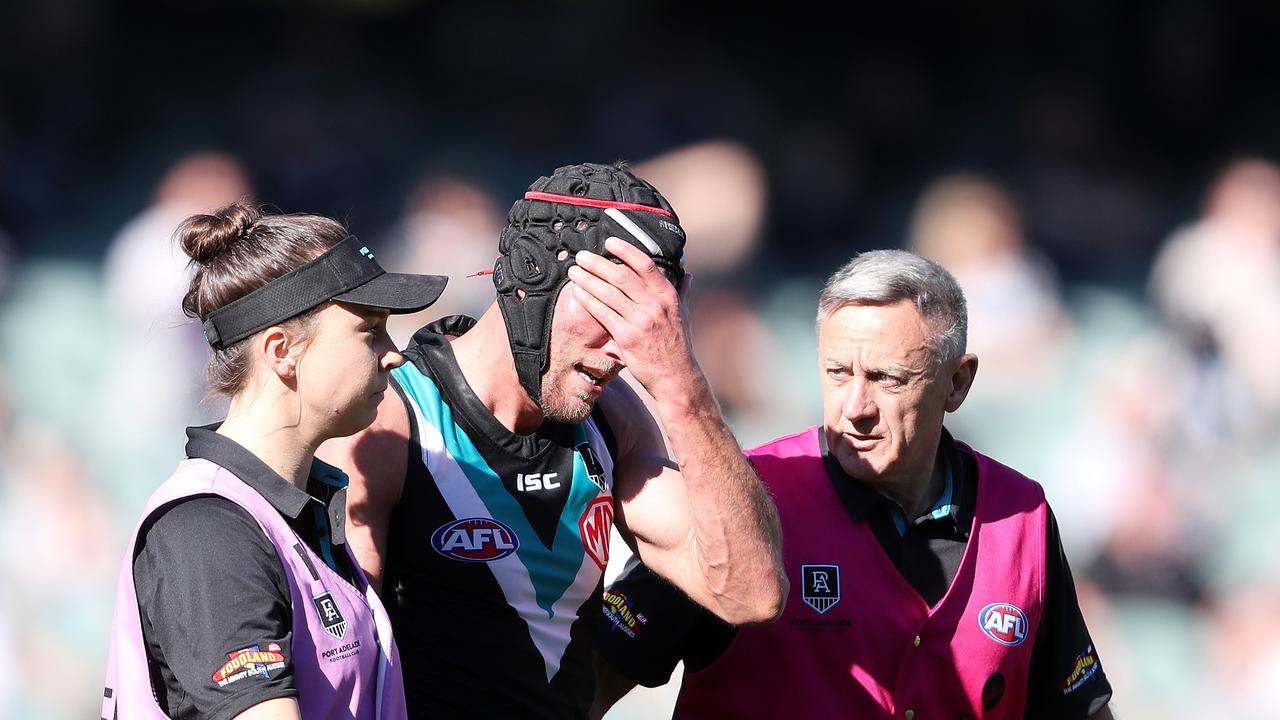The science behind concussion — what happens to the brain when the head gets hit
We’ve heard a lot about concussion but what actually happens to the brain when you cop a knock to the noggin? The clever heads at Cosmos Magazine explain.
Concussion research began in 1928 – and while there has been a recent focus due to sport-inflicted injuries, many concussions still go unrecognised.
This happens for many reasons. In the case of sportspeople it could be about fear of seeming weak or fear of missing a selection round; in the case of the general public, it’s often about just not being aware of the prevalence and symptoms of concussion.
There is also a key difference between someone being deemed able to “return to play”, which is largely about subjectively picking up on symptoms of concussion, and being “recovered”, which is largely about objective science.
Cosmos Magazine asked Dr Alan Pearce, a neuroscientist at La Trobe University, some key questions about concussion to get a better understanding of what actually happens.
What happens inside the skull to cause a concussion?
Concussion is first and foremost a brain injury. But the signs and symptoms of concussion, which are the mildest on the brain injury “spectrum” (from mild to severe) represent a transient disruption in neurological function following an impact to the brain (or an indirect impact to the body that transmits the force to the brain).
While the brain doesn’t change shape per se; the disruption in function is due to the impact stretching and shearing the neurons. The damaged neurons will release molecules and neurotransmitters into the extracellular space which makes neural transmission (ie impulses) impaired. This is why you see the signs and symptoms common to concussion.
What type of matter is the brain and how does that affect internal injuries compared to other organs?
Brain tissue is very delicate. Unlike a “fixed” brain – the ones we used to dissect in biology classes – the consistency of brain tissue is little more than “chunky custard”. If you were to take your brain out of your skull, you could squeeze the contents through your fingers with a little bit of force. What protects our brain tissue is our skulls, which can take a certain amount of force, as well as the brain sitting in a little bit of fluid, called the cerebrospinal fluid, which acts as a shock absorber – to a point.
At higher impacts, the cerebrospinal fluid acts against the best interests of the brain by allowing for greater movement of the brain tissue in the skull. Combined with the delicate nature of brain tissue, this can lead to greater injury than other organs that are more robust in their micro-anatomy.
The egg yolk analogy is a good one, but just imagine the egg yolk having an outer layer, and an inner layer that then creates two different speeds of movement – this is how the stretching and shearing effect occurs.
How quickly does the brain chemically react to a concussion?
Pretty much immediately.
One thing that confuses people is the notion, which is frequently referenced in sport, of “delayed concussion”.
The “delay” is only in the symptom reporting. Following the impact, the chain of events is already in place and it may not be until a certain threshold of impairment that the individual expresses some symptoms, either through self-reporting, or via their behaviour.
Symptoms are not a good indicator of concussion.

Do concussions affect any other parts of the body/health beyond the brain?
Given that concussions/mild brain injuries affect the central nervous system, the knock-on effects are usually to the peripheral nervous system that controls muscle contractions. This can affect balance and coordination at the time, and also during recovery periods.
Concussions also affect the autonomic nervous system, so they can influence such things as heart rate variability and sleep patterns.
Do genetics, biological sex or background influence how a concussion can affect a person?
These are some of the big questions we are trying to investigate at present. We know that if a person has had a previous concussion(s), then subsequent impacts to the head do not need as much force, and the individual will usually express more severe symptoms and will take longer to recover.
This is one reason why I have been campaigning hard publicly for longer recovery time when an athlete is concussed.
With the caveat that the research is very limited at present, we know through the emerging evidence, that women tend to report more severe symptoms and take longer to recover following a concussion compared to males. However, in saying that, while there appears to be some physiological mechanisms for this, I don’t think that it’s as disparate as it’s being made out to be.
One reason is that majority of research is currently still relying mostly on symptom self-reporting, which I think is a terrible indicator, and in 2017 I published this research which showed differences in attitudes and behaviours towards concussion reporting between females and males.

Essentially, due to cultural reasons, males are less likely to be honest in their reporting of concussion and say that they are ready to get back to play much sooner than females!
Genetics is still a very big unknown at present. While we have the APOe gene linked to boxing, where impacts to the head are very frequent and expected, it doesn’t appear to be as strong in contact sports where impacts to the head are more incidental.
Does a child’s brain behave differently to an adult’s brain when it gets a knock on the head/as it recovers from a concussion?
We know it takes much longer for a child’s/adolescent’s brain to recover from a concussion than an adult brain. Moreover, the concern is on the long-term effect of trauma to the developing brain. That’s one reason why children/adolescents need almost double the time for rest and recovery following a concussion than adults, and that the consensus is a return to school should occur before a return to sport.
Is there a point where the brain can no longer fully recover? Why?
That’s a tough question to answer. Because some people after one concussion never recover. I have people coming in to my lab who have had ongoing symptoms more than a year, and some have them for as long as five or six years and they’re still struggling.
With my retired players study, the number of concussions after which the player has chronic issues sometimes may be only a couple, where others report 20. But the common thing here is their career in the sport (several decades), during which their brains have been subjected to repeated trauma without concussions (sub-concussive impacts).
What is the scientific justification behind the 11/12 day rules? Is this based on a statistic?
Another good question. We don’t actually know as they have not provided any specific evidence for this change.
You may want to see my recent paper, currently under review in Sports Medicine journal, where I looked at four years of concussion and return-to- play data showing that in 2020, return-to-play times for AFL players reduced by nearly half that of 2019.
The issue of COVID and the modified fixtures in 2020 should actually have helped increase the return-to-play times, but in fact it did the opposite. The interesting number is that it seems to match closely to the 12 day rules that AFL brought in this year.
Reprinted with permission from cosmosmagazine.com, published by The Royal Institution of Australia.
Originally published as The science behind concussion — what happens to the brain when the head gets hit


